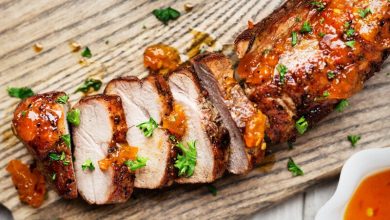🐟🍐 Arctic Char With Pears: A Culinary Delight 🍽️
Arctic Char with Pears is a delightful dish that combines the rich flavors of fresh fish with the sweet and slightly tart notes of ripe pears. This dish is a harmonious fusion of savory and sweet, creating a unique culinary experience. 🎣🍐
History:
The history of Arctic Char with Pears is somewhat elusive, but it likely emerged as a modern fusion of traditional seafood and fruit pairings. Pears have been used in various culinary traditions for centuries, and pairing them with fresh fish is a contemporary twist that provides a balance of flavors.
Components:
- Arctic Char: Arctic Char is a cold-water fish species closely related to salmon and trout. It has a mild, delicate flavor and a buttery texture.
- Pears: Ripe, sweet pears are essential to this dish, providing a contrasting flavor to the fish.
- Herbs and Spices: Common seasonings include fresh dill, lemon, salt, and pepper.
- Olive Oil: For cooking and adding a subtle richness to the dish.
- White Wine: A splash of white wine enhances the flavor profile.
Steps to Prepare Arctic Char With Pears:
-
Preparation:
- Start by preheating your oven to 375°F (190°C).
- Clean the Arctic Char fillets and pat them dry with paper towels. Season both sides with salt and pepper.
-
Pear Prep:
- Slice the pears thinly, removing the core and seeds.
- Sauté the pear slices in a skillet with olive oil until they are slightly caramelized and tender. Set them aside.
-
Cooking the Fish:
- In the same skillet, add a bit more olive oil and heat it over medium-high heat.
- Place the seasoned Arctic Char fillets skin-side down in the skillet and cook for 3-4 minutes until the skin is crispy.
-
Transfer to Oven:
- Transfer the skillet to the preheated oven and bake for an additional 5-7 minutes or until the fish is cooked through.
-
Finishing Touches:
- Remove the skillet from the oven and squeeze fresh lemon juice over the fish.
- Sprinkle fresh dill and add the caramelized pear slices on top of the fish.
-
Serving:
- Plate your Arctic Char with Pears, garnish with additional fresh herbs or lemon zest if desired.
Time Needed:
The time required to prepare Arctic Char with Pears may vary depending on your cooking skills, but on average, it takes approximately 30-40 minutes from start to finish. This is a relatively quick and elegant dish that’s perfect for a special dinner or a weeknight treat. 🕒🍴
This dish is a beautiful combination of flavors and textures, perfect for those who appreciate the delicate taste of fish and the sweetness of pears. Enjoy! 😋👌🍐🐟
Here are the nutrition facts and health information for Arctic Char with Pears:
Nutrition Facts (Approximate Values per Serving):
- Calories: 350-400 kcal
- Protein: 25-30 grams
- Fat: 10-15 grams
- Carbohydrates: 20-25 grams
- Dietary Fiber: 3-4 grams
- Sugars: 10-15 grams
- Vitamin C: 10-15% of daily recommended intake
- Vitamin A: 5-10% of daily recommended intake
- Omega-3 Fatty Acids: A good source, which is beneficial for heart and brain health.
Health Information:
-
Lean Protein: Arctic Char is a great source of lean protein, which is essential for muscle development and repair.
-
Omega-3 Fatty Acids: This dish is rich in omega-3 fatty acids, which are known to have anti-inflammatory properties and are beneficial for heart and brain health.
-
Low in Saturated Fat: The fish and the use of olive oil make this dish relatively low in saturated fat, promoting heart health.
-
High in Vitamins and Antioxidants: Pears contribute to your vitamin C and vitamin A intake, which are essential for immune function and eye health.
-
Fiber Content: The dish contains a moderate amount of dietary fiber, aiding in digestion and promoting a feeling of fullness.
-
Balanced Meal: Arctic Char with Pears is a balanced meal with protein, healthy fats, and carbohydrates, making it suitable for those looking to maintain a balanced diet.
It’s worth noting that the actual nutritional content may vary depending on the specific ingredients and cooking methods used. If you have specific dietary requirements or health concerns, it’s advisable to consult with a healthcare professional or nutritionist for more personalized guidance.




